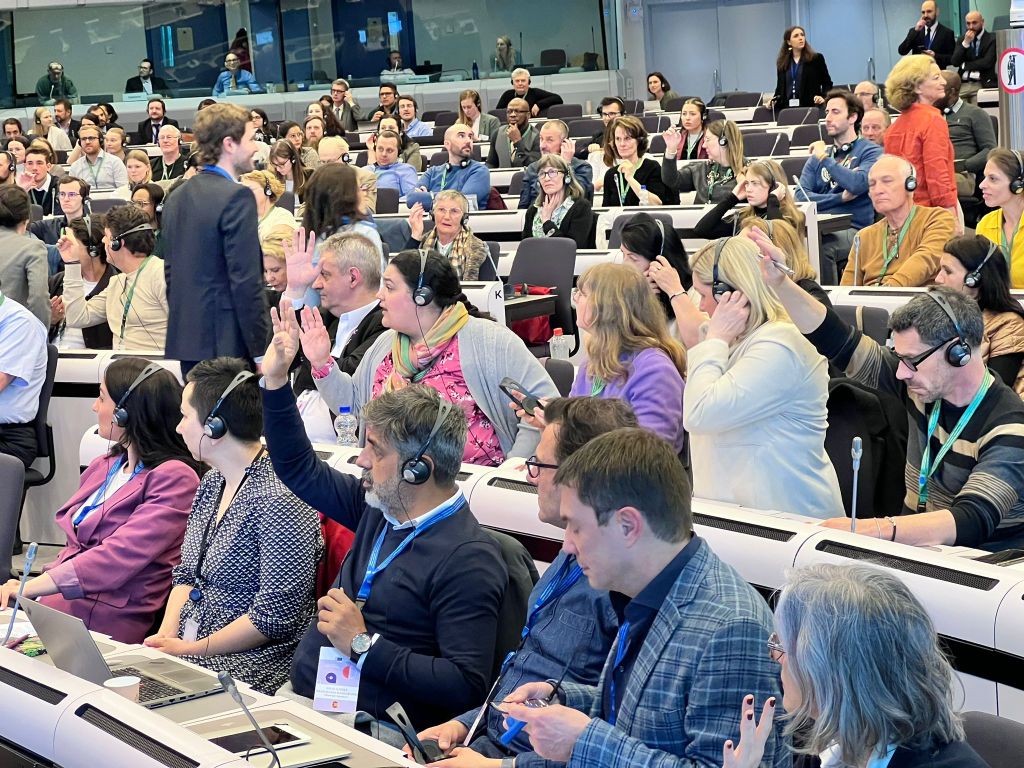CONTEXT AND OBJECTIVES
The European Commission’s citizen panels were established following the conference on the future of Europe (2021-2022). At the end of this event, which brought together 800 citizens, participants made 178 recommendations. These recommendations served as the basis for 49 proposals and over 300 related actions. Citizens specifically requested more participatory moments to engage in European policy-making. Since then, several citizen panels have taken place on topics like food waste, the virtual world, and energy efficiency. This panel addresses the challenging issue of the rise of hate in society: online, in our countries, in Europe, and around the world. The panel’s mission is to identify possible political actions and all relevant stakeholders to involve at various levels, including policymakers, civil society, the private sector, and citizens.
The first session in Brussels (April 5-7) aims to develop a common understanding of hate and identify its main drivers and causes.
The second session, held online (April 26-28), aims to identify fields of action to tackle hatred and develop recommendations.
The third and final session in Brussels (May 17-19) will see the finalization of recommendations and citizen proposals.
To inform the Panel, a knowledge committee has been established, comprising various and complementary expertise. It follows the entire process and supports the coordination team and the citizens. It includes Arun Mansukjani, a clinical psychologist specializing in psychological trauma; Daris Lewis-Recio, legal and policy head at Equinet; Federico Faloppa, professor of sociolinguistics at the University of Reading; Jelena Jovanovic, coordinator of the anti-racism and diversity intergroup at the European Parliament; Manos Tsakiris, professor of psychology at the University of London; Nesrine Saloui, independent journalist and author; Robin Sclafani, director of CEJI and coordinator of the Facing Facts network; Tommaso Chiamparino, special advisor at the Directorate-General for Justice and Consumers, Fundamental Rights Policy Unit (DG Just).

MISSION MODALITIES
As co-coordinators of the panels with our partners at Ifok, Missions Publiques’ role in this project includes methodological design, session facilitation, logistics organization, assistance in forming working groups, moderation, synthesizing recommendations, and coordination with the European Commission for the final presentation.
We also collaborate with Harris Interactive (recruitment), Open Source Politics (online platform), BeenThereDoneThat, WaterBear Network, Scope, and VO EUROPE (communication and logistics).
ADDED VALUE OF THE APPROACH
On December 6, 2023, the European Commission adopted a communication titled “Hate has no place in Europe: unite against hate.” It calls on all Europeans to stand against hate and defend tolerance and respect. The plan’s proposals include additional funding to protect places of worship, new initiatives against online threats, and strengthened cooperation with civil society actors.
The European Commission also implements an active policy by supporting the enforcement of legislation by national authorities. It has adopted specific European strategies such as the European strategy to tackle antisemitism and promote Jewish life, the EU strategic framework for Roma on equality, inclusion, and participation, and an EU action plan against racism at large.
To address the challenges of online hate, the EU has developed a series of laws and initiatives to tackle various digital sphere threats (Digital Services Act). Finally, in 2021, the Commission adopted a communication calling for the EU Council to adopt a decision that would extend the current list of “EU crimes” to include hate crimes and hate speech.
The Panel’s recommendations are intended to strengthen this strategy. An online platform is open for contributions to this debate.
#NoPlaceForHate #UnionofEquality



